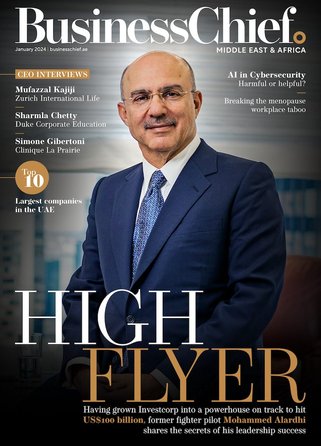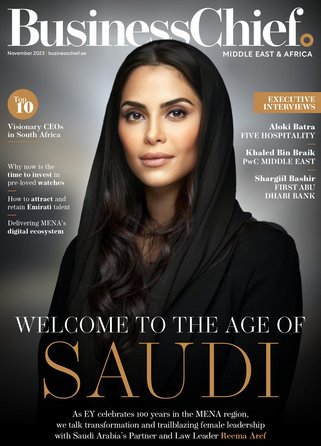Public-private partnerships key to MENA's digital ecosystem

There are few places in the world where digital transformation and digital ecosystems offer as much opportunity as the Middle East & North Africa (MENA). Home to around 6% of the global population and 60% of oil, there is a significant need to diversify economies away from fossil fuels and toward technology. And that creates opportunity.
According to IDC, investments in digital transformation are expected to double over the next few years in the Middle East alone.
The United Arab Emirates (UAE) is emerging as a leading player – not just in this region, but also globally. With a 99% internet penetration rate, matched only by Saudi Arabia and Norway, the nation is doubling down on digital as part of its We the UAE 2031 vision which aims to focus on social, economic, investment and development aspects to enhance the position of the emirates as a global partner and attractive economic hub.
To achieve those goals, the UAE is looking to enhance its digital ecosystem – comprising stakeholders, systems, and an environment that empowers people and communities to use digital technology to access services and engage with each other.
There are many reasons why the UAE is perfectly positioned to deliver on those goals. Aside from the world-leading internet penetration rate, the country also has a young, urban population. Around 88% of people in the UAE live in cities, and the median age is just 33.5 years. Compare that to the US (38 years) and the UK (40 years).
Globally, according to DataReportal, the urban population is 57% and internet penetration stands at 64%, while median age is 30.4 years. Interestingly, it is countries from the MEA region that have some of the lowest median ages (including Nigeria, Egypt, Kenya, South Africa, Ghana, Israel, and Morocco) which highlights the potential for tapping into this digital-savvy demographic.
Organisations have their own digital ecosystems, of course, but those rely on having a robust, secure and state-of-the-art infrastructure to build upon.
“Digital ecosystems are important because they foster collaboration and partnerships between organisations, enabling innovation and growth,” says Faraz Ahmed, Associate, Research at JLL MENA.
“Overall, digital ecosystems are vital for businesses to thrive in the digital age.”
Ahmed, who authored the recent white paper Unleashing the Potential: The Future of Data Centres in the Middle East and Africa, tells Business Chief that digital ecosystems enhance the customer experience by providing personalised and holistic interactions. They also promote innovation and agility by leveraging external resources and expertise. Digital ecosystems also enable data-driven decision-making by integrating and analysing vast amounts of data. Of course, that data requires data centres.
“Data centres are pivotal to digital ecosystems as they provide the essential infrastructure for data processing, storage, and management,” he says. “Overall, data centres are the foundation of digital ecosystems, enabling seamless data exchange, innovation, and efficiency within these interconnected environments.”
The MEA region is making notable progress, particularly in digital transformation, fintech innovation, renewable energy adoption, smart city initiatives, nurturing start-up ecosystems, and advancing telecommunication infrastructure like 5G networks.
Abu Dhabi and Dubai have both been ranked among the top 20 smart cities globally, and Saudi Arabia is fast emerging as a regional player with giga-projects such as NEOM, Qiddiya, and King Abdullah Economic City (KAEC).
Ahmed says that with more investment towards digital transformation, the more data centre players are attracted towards investing in a market to cater to the growing demand for data.
“We see that MEA countries like the UAE, Saudi Arabia, South Africa, and others who are actively investing in these areas, are leading in bridging the digital divide, improving financial access, and having an active and growing hyperscaler and data centre presence.”
The role of AI
There is simply no escaping the importance of AI. A recent PwC report says AI will contribute US$320 billion to the region by 2030, and the recent GITEX GLOBAL 2023 show – the world’s largest tech event – was held under the title ‘The Year to Imagine AI in Everything’.
While some countries are busying themselves with much hand-wringing when it comes to the regulation and implications for society, the UAE is welcoming the technology with open arms. This positive public-sector attitude coupled with private sector specialisation should deliver the best results.
HE Omar Sultan Al Olama, UAE Minister of State for Artificial Intelligence, has emphasised the government's efforts towards strategic collaborations with the private sector – with many international technology giants having their regional HQs in the country.
Such collaborations have been recognised as pivotal for accelerating the adoption of AI, seen as a crucial component of the nation's digital advancement and prosperity.
The UAE government has signed an agreement with Mastercard to fight financial crime, drive inclusive growth and secure the digital ecosystem – thanks to Mastercard recently opening its Global Center for Advanced AI and Cyber Technology in Dubai.
“AI is playing an increasingly transformational role across our lives,” Rohit Chauhan, Executive Vice President, Artificial Intelligence at Mastercard tells Business Chief.
“To secure the digital ecosystem, deploying innovative technologies like AI is now essential. Mastercard’s Centre for Advanced AI and Cyber Technology will enhance AI capabilities and readiness in the region and usher in a new era of transformative technology worldwide.”
Chauhan adds that the UAE is a leader in the fields of AI and digital transformation, and a perfect location for the centre. Mastercard already has a well-established team on the ground so basing its latest AI Centre in Dubai is a natural extension of existing capabilities and a reflection of the region’s commitment to innovation.
It’s fair to say that Mastercard may not be the first name that springs to mind when thinking about AI and cyber – Microsoft, for one, seems to have more skin in the game. So why is it important for Mastercard to be securing the digital ecosystem?
“Given the scale of financial crime and the opportunity for innovation, collaboration between the public and private sectors is critical. We have a shared interest in securing the ecosystem and developing talent in the region,” says Chauhan.
“At Mastercard, we provide governments with comprehensive consultancy services, digital infrastructure, cybersecurity, data protection, analytics and research that improve multiple touchpoints across the entire governance ecosystem. We also help digitise public services while facilitating programs to develop cyber resilience among citizens and assisting small businesses in going digital.”
Talking of talent, that is a hot topic for business leaders globally, especially when it comes to technology. And that’s where academia joins the public and private sectors to collaborate on delivering an ecosystem for the ecosystem.
Talent – ecosystem for the ecosystem
The Rochester Institute of Technology (RIT) in Dubai is working with Mastercard to deliver the next generation who will not only fill the jobs of the future but also help shape the future direction of the technology itself.
“Collaboration between educational institutions and businesses allows the diversification of the economy and assuring supple communities who can embrace new trends as they emerge,” Dr Yousef Al Assaf, President, The Rochester Institute of Technology (RIT) tells Business Chief.
“We pride ourselves on having more than 30 governmental and private partners who we closely work with to define skill sets required in employees now and in the future.
“The importance of creating public and private partnerships is more and more realised and celebrated in the Middle East but still more adoption is needed.”
Partnerships of all forms are clearly essential for digital ecosystems to succeed, and the partnership between Mastercard, RIT and the UAE Government is a prime example. The emergence of generative AI and its seemingly endless possibilities only adds to the importance.
“Collaboration is key to unlock its potential,” says Chauhan. “Partnerships have become an imperative to address today’s most pressing challenges and accelerate innovation. Leveraging our partners’ strengths, we can propel the region’s digital transformation and reinforce trust in the ecosystem.”
Few regions are experiencing digital transformation to the degree that we are seeing in the Middle East, and countries such as the UAE are becoming genuine contenders for recognition as Silicon Valley 2.0.
The recent GITEX tech event – the world’s largest, and held in Dubai – showed the appetite for positioning the UAE as a genuine hub for innovation and tech startups. RIT’s Dr Al Assaf believes the UAE is already a leader in the new digital world.
“Leadership’s commitment and support to make UAE a global digital leader is an exemplar,” he says. “Not only supporting innovation and adaptation of new digital technologies but also working in leading the creation of the regulatory and governance structures for sound, safe and ethical implementation.
“From digitising systems to thinking and executing digitally, the UAE has it all.”
Featured Articles
SAP has announced it has appointed a new President for a newly-created EMEA region, aiming to make the most of the opportunities of cloud and AI
technology
From fighter pilot to fashion house financier, Mohammed Alardhi has taken Investcorp to great heights – so what’s the secret to his success?
Dr Omar Al-Attas, Head of Environmental Protection and Regeneration at Red Sea Global, shares his COP28 hopes and approach to regenerative tourism
strategy



